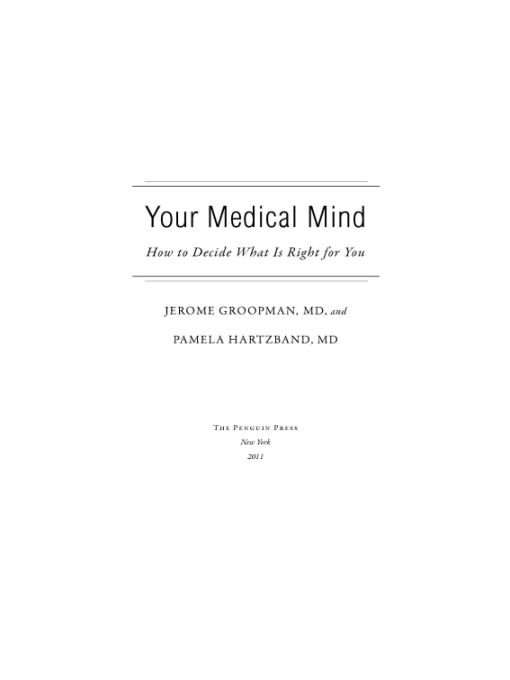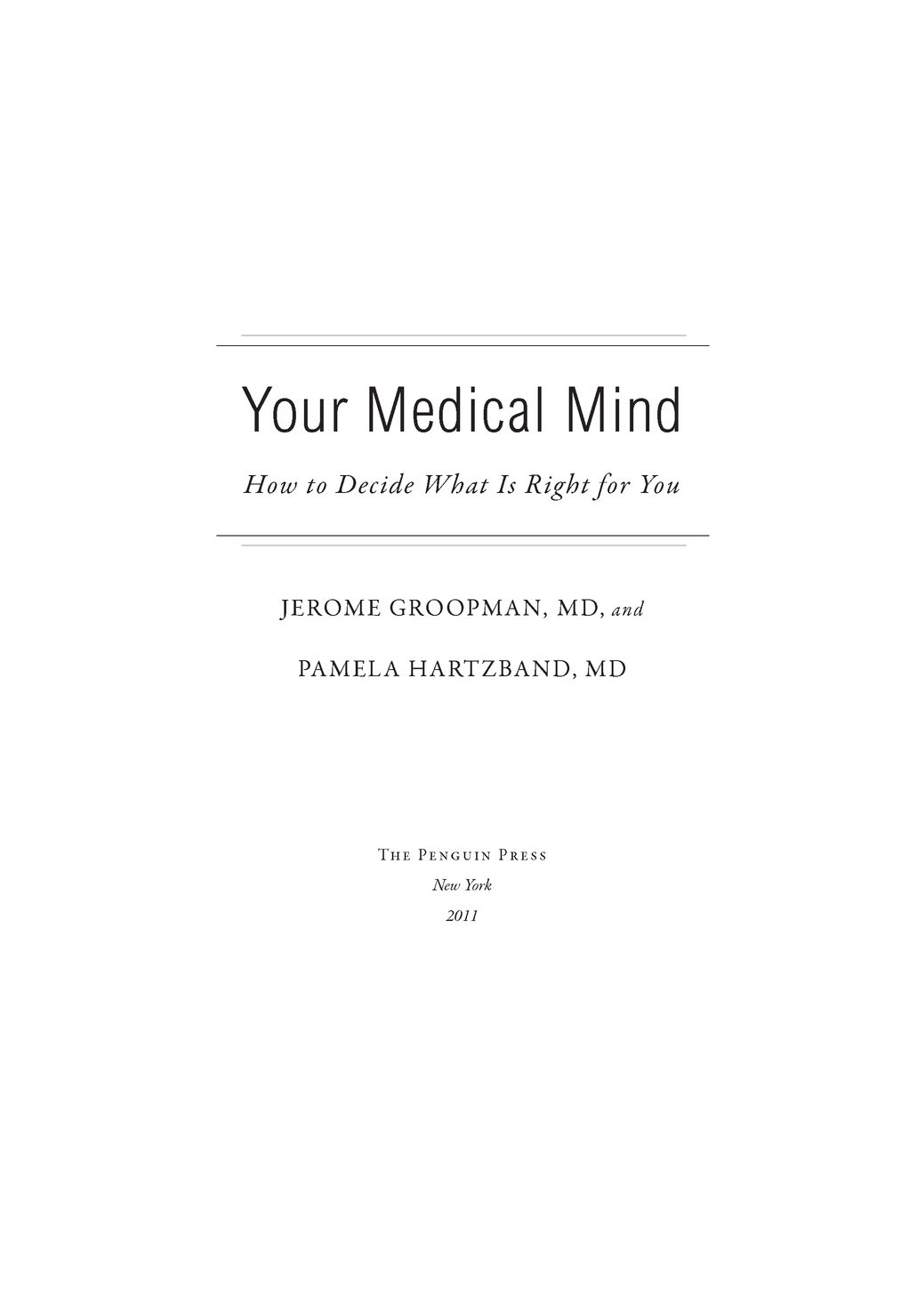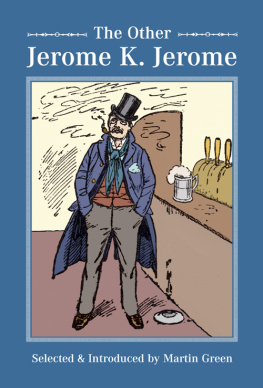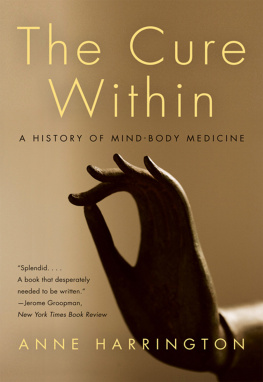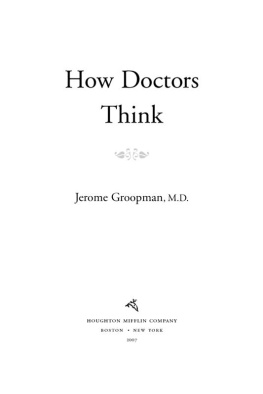Table of Contents
ALSO by JEROME GROOPMAN
How Doctors Think
The Anatomy of Hope
Second Opinions
The Measure of Our Days
To Harry and Fran Hartzband, who taught us that a believer
and a doubter can share love and marriage and can
agree to disagree for more than six decades
Introduction
We are drowning in information, while starving for wisdom.
E. O. WILSON
Every day, thousands of people consider whether or not they should take a medication or undergo a medical procedure. For some its a question of prevention, how to stay healthy. Others must choose among different options for treating an illness. Making these decisions is harder than ever. Theres certainly no lack of informationfrom doctors, the Internet, television, radio, magazines, and self-help books. Experts everywhere are telling you what to do. Some assert that you need moremore tests and more treatment. Others insist that you need less. How do you know what is right for you? The answer often lies not with the experts, but within you.

Dave Simon had been working for months to improve his serve. Recently retired, still trim and athletic, he was trying hard to bring his tennis game up to the next level. Now it was match point, and Dave was determined to win. He served wide and ran to the net, lunging to return a low volley. As his racket met the ball, he collapsed onto the cool clay of the court. He tried to get up but realized that his right arm and leg would not move. He heard his partner calling out to him, asking if he was okay. Dave had the words in his head to answer but found that he couldnt speak.
So this is what it means to have a stroke. My doctor warned me this could happen.
The door to the examining room clicked open and his cardiologist entered. Dave snapped out of his terrifying daydream. He was not on the tennis court, but in his cardiologists office. He stretched his right arm and leg, reassuring himself that nothing had really happened.
Good morning, Mr. Simon, the doctor said. Have you had a chance to think more about the medicine? Are we going to start treatment today?
On a routine checkup several weeks earlier, Daves internist had found that his pulse was irregular. An electrocardiogram revealed that he had atrial fibrillation, a common abnormal heart rhythm. Dave was referred to a cardiologist, but his repeat EKG was normal. The cardiologist recommended that he wear a heart monitor throughout the day, which showed that he was still having episodes of the abnormal rhythm, even though he didnt realize they were happening. She explained that this condition could cause clots to form in Daves heart; those clots might break off and go to his brain, causing a stroke. But the risk of stroke was low. There were medications that could help stop the clots from forming. But these drugs had serious potential side effects, primarily bleeding.
Dave was friendly with a neighbor who had been on such a drug. Several years ago, on a flight to Europe, his friend began to vomit massive amounts of blood. He almost died in the plane. The flight was diverted to Greenland, and the man, in shock, was rushed to the hospital. Emergency surgery saved his life.
Daves mind veered back and forth between his chilling fantasy of a stroke and the image of his friend nearly bleeding to death. He looked at his cardiologist and replied, I havent decided yet.
Dave was caught in what psychologists call decisional conflict, uncertain which option to choose. He knew the stakes were high and anticipated regretting either choice.
Susan Powell had already made her decision when we spoke with her. She wasnt going to take a statin drug for her high cholesterol.
Susan wasnt ignorant about high cholesterol and its consequences. Nor was she in denial, as some physicians liked to put it. Fifty-one years old, she spent her days as a nurses assistant caring for people of all ages and backgrounds with a variety of diseases from congestive heart failure to cancer. Her doctor had explained that high cholesterol levels could lead to heart disease and stroke and advised her to begin taking a statin pill. Susan was familiar with this type of drug, which is sold under brand names like Lipitor, Crestor, and Zocor. Some of the people she took care of were on it, and she had seen ads promoting these drugs on TV and in magazines.
My father also had high cholesterol, and he died after a long and healthy life, without taking any medication. She told us that when her own health is at issue, she is the kind of patient who approaches medical treatment with skepticism. Im careful about what I put into my body, and I dont like medication, she said. If I have a headache, I just deal with it; I dont immediately reach for Tylenol. Susan is a doubter. You may see your own thinking in her, or she may remind you of a friend or family member.
Or you may take a very different approach to treatment, like Michelle Byrd. Michelle is an administrator at a university near Boston. Shes in her fifties, too, she exercises every day, and shes proud that she can power walk two miles in less than twenty-nine minutes. Her college degree was in nutrition, and she is attentive to her diet. A routine checkup a few years ago revealed that she had mild high blood pressure. I started taking medicine right then, Michelle told us. Im focused on doing the best I can for myself, and that means being proactive. Both her parents had hypertension, but neither had suffered any of its consequences like stroke, heart attack, or kidney disease. And I dont want to either.
When Michelle Byrd began treatment, the first medication did not improve her blood pressure and a second drug caused side effects. She didnt hesitate to switch to yet another antihypertensive medication, and shes had no problem with this one.
Every morning and evening, Michelle checks her blood pressure at home and updates a chart of the results. When theres a problem, Ill do everything I can to get as perfect a resolution as possible, she said. When we asked whether she was satisfied with her current systolic blood pressure in the low 120s, she paused and then answered, Im borderline okay with that. Then, after another pause: Not really. She knows that 120 is viewed as a normal cutoff, but, she said, Id much rather be at 110. So shes asked her doctor to increase the dose of her current medication or add another treatment. He told her this wasnt necessary, but she still presses him for more. Michelle seeks to do the maximum. Thats the way I am. When I set a goal, thats it. Michelle is a believer, certain that maximizing treatment is the best way to stay healthy.
Soon after we spoke with Susan Powell and Michelle Byrd, we met Alex Miller, whos also in his fifties. Alex is an accountant, a precise and organized man who spends his days crunching numbers. He has both high cholesterol (like Susan) and mild high blood pressure (like Michelle). While Susan Powell is convinced that taking a statin pill for her high cholesterol makes no sense, Alex Miller takes this medication every day, believing that it will help keep him healthy. So you might predict that Alex would be like Michelle Byrd in his approach to blood pressure readings above the normal range. But he decided that it doesnt make sense for him to take medication for high blood pressure.

